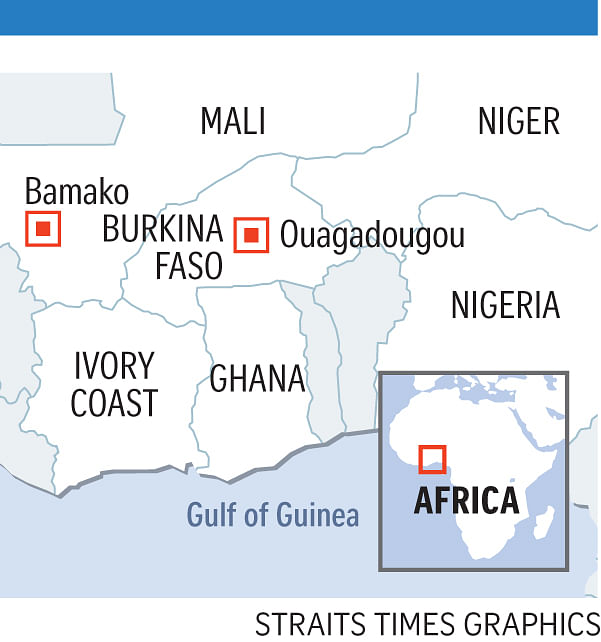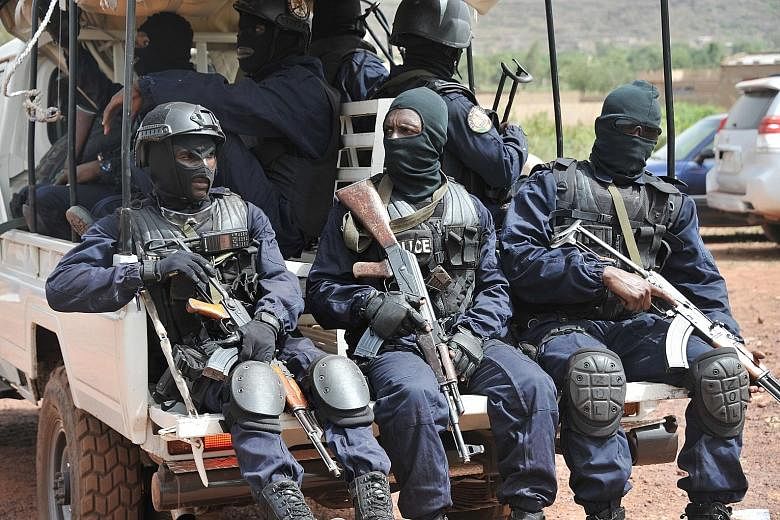JOHANNESBURG • Before Ibrahim Malam Dicko became Burkina Faso's first-ever Islamist militant leader, his sermons were so popular that listeners thronged to the radio station that broadcast them to obtain the recordings.
Today, the mosque in northern Djibo province where the slight, unimposing man used to preach is closed, and the mud-brick walls of his village's school are riddled with bullet holes. Hundreds of people have fled as soldiers hunt the West African nation's most-wanted man, who is known as Malam, or teacher.
Dicko's transformation from popular preacher to an advocate of Islamist violence has dented Burkina Faso's reputation for religious tolerance and mirrors a wider trend in West Africa.
While attacks were rare a decade ago, militant strikes in Ivory Coast, Mali, Chad and Niger have killed hundreds of people in the past few years. In the latest incident, gunmen opened fire at a resort that is popular with foreigners on the outskirts of the Malian capital, Bamako, on Sunday.
Further afield, the insurgency by the Boko Haram Islamist movement in Nigeria has claimed thousands of lives since 2009, while Senegal and Niger have started arresting Muslim preachers seen as shifting towards fundamentalist versions of Islam.
"Malam was challenging the authority of religious leaders and traditional chiefs, and he called for equality in a province that has what is essentially a caste system," Ms Cynthia Ohayon, an analyst for the International Crisis Group, said.
The sudden rise of his group, Ansaroul Islam, or "Combat for Islam", has sparked fears that Burkina Faso is following Mali, a country on the brink of collapse since militants overran the north in 2012.

Burkina Faso and Mali are among five countries in the region planning to set up a joint military force to fight militants. The European Union says it will contribute €50 million (S$77 million) to the force.
"The growing spillover of instability in Mali into its neighbours demonstrates the need for enhanced regional cooperation," United Nations Secretary-General Antonio Guterres said in a report last week.
Dicko, 50, used his sermons to criticise local customs that put pressure on people to pay religious leaders and organise lavish ceremonies, according to Djibo resident Issa Dicko, who is not related to the preacher. "We used to have all-day weddings and drawn-out birth ceremonies," he said. "Malam's sermons put an end to the night-time festivities. He managed to instil sobriety."
As Dicko's influence spread, his message hardened - so much so that other Muslim organisations began to complain. In 2013, after meeting the leader of an Islamist group in Mali, Dicko was arrested and jailed in Bamako. Two years later, he returned to Burkina Faso.
There, he claimed responsibility for an attack in December last year in Nassoumbou, about 30km from the border with Mali. In January this year, assassinations of government officials began, while armed men visited 10 schools to tell teachers to switch to Arabic. In March, gunmen on motorbikes shot dead a teacher. This month, five people were killed in one night. All schools in the area have closed.
The threat that Malam posed may have been overlooked by the intelligence services following the ouster of then President Blaise Compaore in 2014, said Ms Ohayon.
"The government must acknowledge that this is a long-term problem and that strengthening its military presence isn't enough - they need to establish trust," she said.
BLOOMBERG

